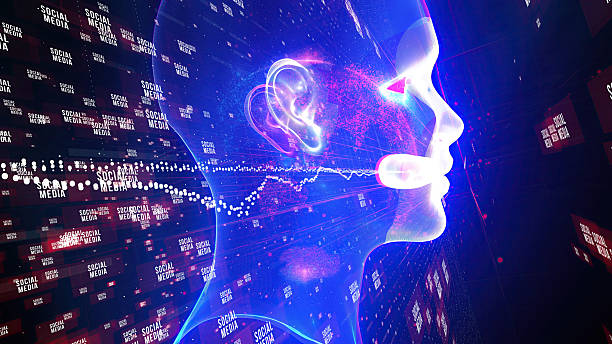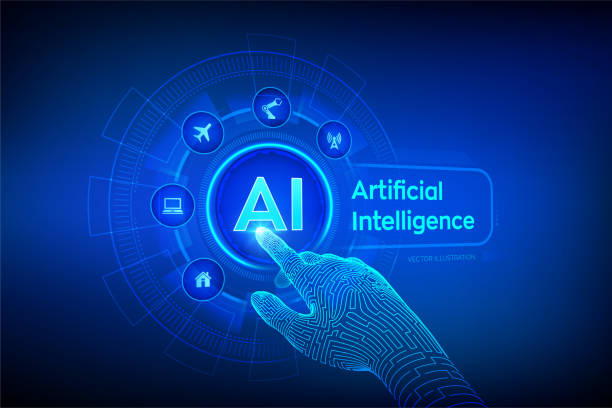What is Artificial Intelligence and what are its applications?

Artificial Intelligence (AI), in short, is a branch of computer science that focuses on building machines capable of performing tasks that typically require human intelligence.
These tasks include learning, reasoning, problem-solving, natural language understanding, and pattern recognition.
#Artificial_Intelligence is no longer a science-fiction concept, but has become a tangible reality in our daily lives.
The applications of artificial intelligence are vast and diverse.
Some of the most important ones include:
- Self-driving cars: Tesla and other companies are developing vehicles that can drive without human intervention using artificial intelligence.
- Medical diagnosis: AI can assist doctors in diagnosing diseases, analyzing medical images, and providing appropriate treatments.
- Customer service: Chatbots and virtual assistants using AI can answer customer questions and resolve their issues.
- Market prediction: AI can analyze market data to predict future trends and help investors make better decisions.
- Cybersecurity: AI can help identify and combat cyber attacks.
These are just a few examples of the countless applications of artificial intelligence.
With technological advancements, AI is expected to play an increasingly prominent role in our lives.
Does your company’s website perform as befits your brand? In today’s competitive world, your website is your most important online tool. Rasaweb, specializing in professional corporate website design, helps you to:
✅ Build credibility and customer trust
✅ Convert website visitors into customers
⚡ Get a free consultation!
The History of Artificial Intelligence: From Idea to Reality

The idea of building intelligent machines dates back decades.
In 1950, Alan Turing, an English mathematician and computer scientist, proposed an experiment known as the “Turing Test.”
This test is a criterion for measuring a machine’s intelligence.
If a machine can convince a human that it is conversing with another human, then that machine has passed the Turing Test and can be considered intelligent.
In the 1950s and 1960s, extensive research was conducted in the field of artificial intelligence.
Scientists hoped that they would soon be able to build machines capable of performing complex tasks.
However, progress was slow, and in the 1970s, interest in AI somewhat declined.
In the 1980s and 1990s, with the emergence of more powerful computers and new algorithms, artificial intelligence regained attention.
During this period, expert systems and neural networks emerged as powerful tools in the field of AI.
Expert systems are systems that store the knowledge of an expert in a specific domain and can help users solve problems related to that domain.
Neural networks are also mathematical models inspired by the structure of the human brain, capable of learning patterns in data.
In the 21st century, with the increase in data volume and hardware advancements, artificial intelligence has made significant progress.
Deep learning, a branch of AI that uses deep neural networks, has emerged as a powerful tool in various fields, including image recognition, natural language processing, and robotics.
Today, artificial intelligence is applied in many industries and domains and is rapidly developing.
Types of Artificial Intelligence: From Narrow AI to General AI

Artificial intelligence can be divided into various categories based on its capabilities and functions.
One of the most common classifications divides AI into three main categories:
- Narrow AI: This type of artificial intelligence is designed to perform a specific task and excels at it.
Most AI systems today are narrow AI.
For example, a facial recognition system or a customer service chatbot are examples of narrow AI. - General AI: This type of artificial intelligence possesses cognitive abilities similar to humans and can perform any task a human can.
General AI is still in the research stages and has not yet been fully developed. - Super AI: This type of artificial intelligence surpasses human intelligence and can solve more complex problems and offer greater innovations.
Super AI is a hypothetical concept and does not yet exist.
Understanding the difference between these types of artificial intelligence is crucial for comprehending the potentials and challenges of AI’s future.
A table is provided below for better understanding of this topic.
| Type of AI | Capabilities | Current Status |
|---|---|---|
| Narrow AI | Performs a specific task | Most common type of AI |
| General AI | Human-like cognitive abilities | In research stages |
| Super AI | Surpasses human intelligence | Hypothetical concept |
Machine Learning and Deep Learning: The Backbones of Artificial Intelligence

Machine Learning and Deep Learning are two key concepts in the field of artificial intelligence.
Machine learning enables machines to learn from data without being explicitly programmed.
In other words, machines use specific algorithms to identify patterns in data and make decisions or predictions based on those patterns.
Deep learning is a branch of machine learning that utilizes deep neural networks.
Deep neural networks consist of many layers, with each layer extracting different features from the data.
These networks enable machines to solve more complex problems that are difficult to solve using traditional machine learning algorithms.
Deep learning has been applied in various fields such as image recognition, natural language processing, and robotics.
The main difference between machine learning and deep learning lies in the type of algorithms used and the amount of data required.
Deep learning typically requires a large volume of data to learn effectively.
Whereas machine learning can also work with smaller amounts of data.
Machine learning and deep learning algorithms are continuously evolving, and with technological advancements, we will witness the emergence of new and more powerful algorithms.
Is your online sales not what you expect? With Rasaweb, permanently solve the problem of low sales and poor user experience!
✅ Increase visitor-to-customer conversion rates
✅ Create an enjoyable user experience and boost customer trust
⚡ Act now for a free consultation!
Key Algorithms in Artificial Intelligence: From Regression to Neural Networks

Various algorithms exist in artificial intelligence, each designed to solve specific problems.
Some of the most important of these algorithms include:
- Regression: Regression algorithms are used to predict a continuous value based on one or more other variables.
For example, regression can be used to predict the price of a house based on its area, location, and other features. - Classification: Classification algorithms are used to assign an object to a specific category.
For example, classification can be used to determine whether an email is spam or not. - Clustering: Clustering algorithms are used to group similar objects into a cluster.
For example, clustering can be used to identify different customer groups based on their purchasing behavior. - Neural Networks: Neural networks are mathematical models inspired by the structure of the human brain.
These networks can learn patterns in data and be used to solve various problems, including image recognition, natural language processing, and prediction. - Genetic Algorithms: Genetic algorithms are inspired by the principles of biological evolution.
These algorithms seek to find the best solution to a problem by creating different populations of solutions and selecting the best ones through processes such as mutation and recombination.
Choosing the appropriate algorithm for a specific problem depends on the type of data, the objective of the problem, and computational constraints.
Familiarity with various AI algorithms is crucial for developing intelligent systems.
Google’s Machine Learning crash courses can be useful for learning these algorithms.
Natural Language Processing (NLP): Understanding and Generating Human Language

Natural Language Processing (NLP) is a branch of artificial intelligence that enables machines to understand and generate human language.
NLP has applications in various fields such as machine translation, text summarization, sentiment analysis, and chatbots.
Some of the most important tasks in NLP include:
- Named Entity Recognition: Identifying and classifying named entities such as names of people, organizations, locations, and dates in a text.
- Syntactic Parsing: Analyzing the grammatical structure of a sentence.
- Semantic Analysis: Understanding the meaning of a sentence or text.
- Natural Language Generation: Producing text in human language.
With technological advancements, NLP is rapidly developing, and we are witnessing the emergence of large and powerful language models like GPT-3 and BERT, which can generate very high-quality texts and perform complex tasks in natural language processing.
These models are used in content generation, question answering, and other language-related applications.
Robotics and Artificial Intelligence: The Collaboration of Machines and Humans

Robotics and artificial intelligence are two related fields that are increasingly integrating with each other.
Robotics deals with the design, construction, operation, and application of robots.
Artificial intelligence enables robots to act intelligently and make decisions.
Intelligent robots can perform complex tasks that are difficult or impossible for traditional robots.
The applications of robotics and artificial intelligence are vast and diverse.
Some of the most important ones include:
- Industry: Intelligent robots can be used in production lines for repetitive and dangerous tasks.
- Medicine: Surgical robots can perform operations with greater precision.
- Services: Service robots can provide customer services in hotels, restaurants, and stores.
- Space: Space robots can assist humans in space exploration.
With technological advancements, intelligent robots are expected to play a more prominent role in our lives and assist us in performing various tasks.
#AI_in_Robotics leads to increased productivity and reduced risks.
| Application Area | Examples | Advantages |
|---|---|---|
| Industry | Production line robots | Increased productivity, reduced risks |
| Medicine | Surgical robots | Increased surgical precision |
| Services | Service robots in hotels | Improved customer service |
| Space | Space robots | Space exploration |
Challenges and Concerns of Artificial Intelligence: Ethics, Security, and the Future of Work

Artificial intelligence, despite its many advantages, also comes with challenges and concerns.
Some of the most important of these challenges include:
- Ethics: AI should be designed to be compatible with human ethical values.
AI decisions should not be discriminatory or unfair. - Security: AI systems must be protected against cyber attacks and manipulation.
Hacking an AI system can have very serious consequences. - Future of Work: AI can lead to the loss of some jobs.
Governments and organizations must be prepared for this and provide programs for worker training and empowerment. - Privacy: AI systems often require a large volume of data.
The collection and use of this data must be done in a way that respects individuals’ privacy.
Overcoming these challenges is crucial for the responsible development and use of artificial intelligence.
Societies must collaborate and brainstorm to find solutions to these challenges.
The Electronic Frontier Foundation (EFF) works on digital rights and internet freedoms.
Tired of losing business opportunities due to not having a professional corporate website? Worry no more! With Rasaweb’s corporate website design services:
✅ Your brand’s credibility and professionalism will increase.
✅ You will attract more customers and sales leads.
⚡ Get a free consultation right now to start!
The Future of Artificial Intelligence: What Can We Expect?

The future of artificial intelligence looks very bright and promising.
AI is expected to play an increasingly prominent role in our lives and assist us in performing various tasks.
Some of the most important future trends in AI include:
- General AI: Achieving General AI is a long-term goal for many AI researchers.
If this goal is realized, AI could have a profound impact on society. - Explainable AI: Increasing the transparency and comprehensibility of AI decisions.
This helps to increase trust in intelligent systems. - Automated AI: Developing systems that can automatically design and train machine learning algorithms.
- Integration of AI with other technologies: Integrating AI with other technologies such as the Internet of Things, blockchain, and virtual reality.
With technological advancements, we will witness more innovations in the field of artificial intelligence.
AI has the potential to significantly improve our lives.
Meanwhile, education and preparation for the changes brought about by artificial intelligence are highly important.
Individuals must learn new skills to succeed in the future world shaped by AI.
Artificial intelligence will serve humanity if managed correctly.
How to Learn Artificial Intelligence? Resources and Educational Strategies

Learning artificial intelligence can be an exciting and rewarding journey.
Many educational resources are available for learning AI, including:
- Online Courses: Educational platforms such as Coursera, Udacity, and edX offer a variety of courses in artificial intelligence.
- Books: Many books on AI are available that can help you learn basic and advanced concepts.
- Scientific Articles: Scientific articles can help you understand the latest advancements in AI.
- Practical Projects: Undertaking practical projects can help you apply your knowledge of AI.
- Online Forums: Online forums can help you connect with other AI enthusiasts and exchange information.
To begin learning artificial intelligence, you can familiarize yourself with fundamental concepts such as machine learning, deep learning, and natural language processing.
Then, you can learn a programming language like Python and start working on practical projects.
#Artificial_Intelligence requires patience and perseverance, but with effort and practice, you can achieve success in this field.
Finally, remember that learning artificial intelligence is a continuous process, and you must always be learning and updating your knowledge.
The future belongs to those who understand AI and can use it effectively.
Artificial intelligence is a powerful tool that can make the world a better place.
Frequently Asked Questions
| Question | Answer |
|---|---|
| What is the definition of Artificial Intelligence (AI)? | It is a field in computer science that aims to create intelligent machines capable of thinking, learning, problem-solving, and decision-making like humans. |
| Mention some common applications of Artificial Intelligence. | These include self-driving cars, voice assistants (like Siri and Alexa), recommendation systems (like Netflix and Amazon), facial recognition, and medical diagnosis. |
| What is the difference between Narrow AI (ANI) and General AI (AGI)? | Narrow AI is specialized in a single, specific task, while General AI possesses human-like intellectual ability to perform any cognitive task. |
| What is Machine Learning and its relation to Artificial Intelligence? | Machine learning is a branch of artificial intelligence that focuses on developing algorithms that allow systems to learn from data without explicit programming. |
| What are Artificial Neural Networks? | They are computational models inspired by the structure and function of the human brain, used in deep learning to process data and discover complex patterns. |
| Mention some ethical challenges related to Artificial Intelligence. | These include privacy issues, bias in data and algorithms, job displacement, and accountability in case of errors or unfair decisions. |
| What is Natural Language Processing (NLP)? | It is a branch of artificial intelligence that focuses on enabling computers to understand, interpret, and generate human language in a useful and interactive way. |
| How can Artificial Intelligence affect the job market? | It can lead to the automation of some routine tasks, requiring worker retraining and creating new jobs in areas of AI system design, development, and maintenance. |
| What is Computer Vision? | It is a field in artificial intelligence that enables computers to “see,” understand, and interpret images and videos in the same way humans do, allowing them to recognize objects and faces. |
| What is the importance of data in developing AI systems? | Data is the fuel that powers AI systems, especially in machine learning. The quality and quantity of data significantly affect the accuracy and performance of models and their ability to learn and make correct decisions. |
And other services of Rasaweb Advertising Agency in the field of advertising
Smart Digital Advertising: An effective tool for analyzing customer behavior using real data.
Smart Marketing Automation: An effective tool for digital branding with the help of marketing automation.
Smart Sales Automation: A fast and efficient solution for online growth focusing on marketing automation.
Smart Custom Software: A professional solution for analyzing customer behavior with a focus on custom programming.
Smart Link Building: Designed for businesses seeking user engagement through customized user experience.
And over hundreds of other services in the field of internet advertising, advertising consultation, and organizational solutions
Internet Advertising | Advertising Strategy | Advertorials
Resources
AI Articles on Digikala MagIranCell AI NewsZoomit AI GuideISNA AI Developments
Are you looking for a big leap in your online business? ? Rasaweb Afarin Digital Marketing Agency offers specialized services including WordPress website design, SEO, and digital advertising, providing intelligent solutions for your growth and visibility in the online space. With us, your business’s digital future is brighter.
📍 Tehran, Mirdamad Street, Next to Central Bank, Southern Kazeroun Alley, Ramin Alley, No. 6



